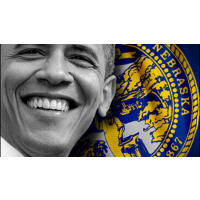Nebraska Republicans Fight to Get Rid of One Democratic Electoral Vote
 (CBS/AP graphic)
(CBS/AP graphic)
Republicans in the very red state of Nebraska have decided it’s time to erase any possibility of a Democrat winning even a single electoral vote in future presidential contests.
Unlike most states, Nebraska does not award of all its electoral votes to a single candidate (Maine being the only other state to do this).
Under the current system, it is possible for a Democratic presidential candidate to pick up one of Nebraska’s five electoral votes. Barack Obama accomplished this rare feat in 2008, which marked the first time that had happened for a Democrat since 1964 with Lyndon Johnson. Obama’s visits to the state, his opening of a campaign office and winning an electoral vote generated enthusiasm among Nebraska Democrats and even a jump in voter registrations, according to state Democratic chairman Vince Powers.
However, Obama did not collect any in 2012, when Mitt Romney took of all Nebraska’s electoral votes. And Republicans don’t want to see a Democrat snatching away any of those votes again—even one.
“It’s just recently that the antagonism has gotten so great in this state — and nationally, I think — that it’s gotten much more frustrating being a Democrat in Nebraska,” William Forsee, a Democratic activist who cast the state’s electoral vote for Obama in 2008, told The New York Times.
GOP leaders now want to change state law and turn Nebraska into a winner-take-all state, as is the case with 48 other states. A bill has been drafted and it’s been assigned to a committee. But there have been 10 previous attempts to change the law, and all of them have failed. However, some observers think this time it may happen since Republicans control the legislature and the governor’s office.
“We’ve been such a minority for quite a while, so I don’t look at it as an emotional blow,” added Forsee. “I look at the Republicans in this fashion being a spoiled child: ‘We didn’t get our way, and we didn’t get our vote, and now we’re going to change the rules.’”
“It’s obvious that the majority of citizens of the state of Nebraska are Republicans,” J. L. Spray, the state Republican Party chairman, told the Times. “They want to have the maximum voice in the Electoral College.”
- Danny Biederman, Noel Brinkerhoff
To Learn More:
Blue Dot for Obama Prompts Red Nebraska to Revisit Electoral College Rules (by Mitch Smith, New York Times)
Filibuster Likely To Sink Nebraska's Electoral Votes Winner-Take-All Bill (by Paul Hammel, World-Herald Bureau)
- Top Stories
- Unusual News
- Where is the Money Going?
- Controversies
- U.S. and the World
- Appointments and Resignations
- Latest News
- Musk and Trump Fire Members of Congress
- Trump Calls for Violent Street Demonstrations Against Himself
- Trump Changes Name of Republican Party
- The 2024 Election By the Numbers
- Bashar al-Assad—The Fall of a Rabid AntiSemite






Comments